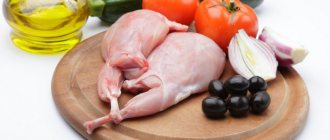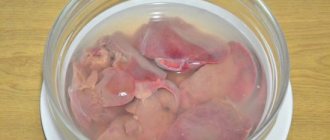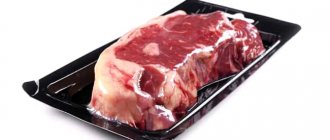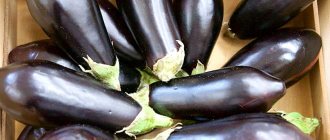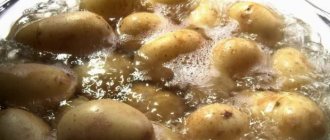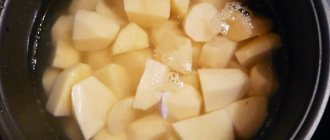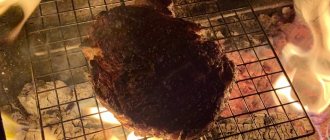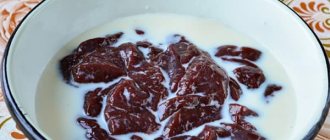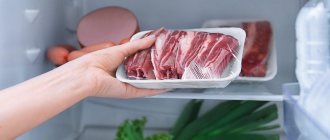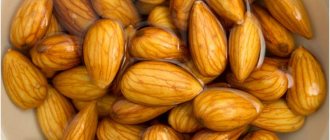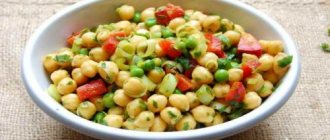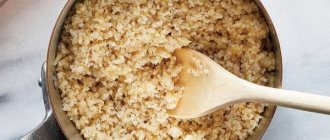How to soak roe deer meat?
The meat needs to be soaked in plenty of water for about 8-10 hours. The water needs to be changed 8-10 times. It is better to dissolve vinegar in the last water to create a slightly acidic solution. During the soaking process and under the influence of acetic acid, the meat becomes softer and the smell disappears.
Interesting materials:
How to do the plank exercise correctly for beginners? How to do the plank exercise correctly and how much? How to do morning exercises correctly? How to do visualization correctly? How to do wet cleaning correctly? How to do lunges correctly to pump up your butt? How to do side lunges correctly? How to take measurements for blinds? How to measure a down jacket correctly? How to take measurements correctly?
What to do?
So, it is known that livestock and poultry are treated, like people, with antibiotics. Moreover, animals are given hormonal injections during the period of rapid growth and then given medications with feed and vitamin complexes as a preventive measure against diseases. But it is also known that antibiotics are not heavy metals and do not accumulate in the body. For them to leave the body, it is enough not to take them for 7-10 days. It remains to be seen whether producers, both large complexes and private farmers, can withstand these few days. Let's assume not quite. Let's assume that we bought meat with “medicines”. What to do?
Article on the topic 5 tricks to make meat tender
For clarification and advice, I turned to a specialist I trust - Svetlana Sheveleva, Doctor of Medical Sciences, head of the laboratory of sanitary and food microbiology and microecology of the Research Institute of Nutrition of the Russian Academy of Medical Sciences . Here's what Svetlana Anatolyevna said:
Brute physical strength
More precisely, mechanical impact. Wrap a piece of meat in a plastic bag and give it a good pound on both sides with a hammer. After beating, even the oldest meat will become softer and more tender. If chops are not your thing, but you need to put the bad meat somewhere, grind it in a meat grinder. White bread and onions soaked in milk will add tenderness to the minced meat.
Often the meat feels too tough due to membranes and tendons that you forgot to remove during processing. Next time, pay more attention to cleaning the meat and everything will work out. But, of course, that's not all! There are other methods in the world, after all.
To wash or not to wash: hygiene rules for food
We are accustomed to thinking that washing promotes cleanliness. Washing clothes, cleaning the house, we wash ourselves, our cars, our pets. In the same way, it seems right to us to wash food before eating it. But should you wash raw meat or chicken? Will washing make these products safer?
Raw meat and poultry
In fact, it is not recommended to wash raw poultry, beef, pork, lamb or veal before cooking. This is due to the fact that bacteria from raw meat can spread to other food products, dishes and kitchen surfaces when washed. This is called cross contamination.
Some consumers believe that washing removes bacteria, making the meat or chicken a safer product. But in reality, some of the bacteria found in raw food may become so firmly attached to dishes or kitchen surfaces when rinsed that you cannot remove them no matter how many times you clean the sink or countertop.
Having these contaminated areas in your kitchen can lead to food poisoning.
Cooking meat and poultry (baking, searing, boiling and grilling) to the proper temperature kills bacteria, so washing is not necessary!
The exception is the presence of visible contaminants on raw meat. Of course they need to be removed!
A food thermometer is the most reliable way to ensure that the food has reached a high enough temperature to kill all dangerous bacteria.
Cook raw meat and chicken to a minimum internal temperature of 62°C and check with a thermometer before stopping cooking.
For added safety and quality, allow the meat to rest for at least three minutes before cutting or eating.
Will soaking meat help get rid of bacteria?
There is a myth that soaking meat or poultry in salt water or water with vinegar increases the food safety of such products.
Pork shish kebab recipe “like in childhood”
The simplest recipe for marinade for barbecue is known to any housewife. Yes, and the owner, so what? After all, most often it is men who conjure over its preparation. Onion, vinegar, pepper and salt - the four components of “Soviet-style” kebabs. This is how meat was marinated in an era when stores did not have such a variety of seasonings and marinades as they do today. Therefore, this recipe is considered classic.
Is it possible to marinate shish kebab without vinegar? Can. And even necessary. In this case, onion pulp will work as a softener. Grind a few fresh onions in a blender, add a little ground pepper and evenly coat the meat with this mixture. Before putting it on the coals, add salt to taste. This way you will prepare a classic kebab without vinegar with a minimum amount of ingredients in the marinade.
However, nowadays there are many spices and kebab recipes, so why not try something new? Follow the basic principles of marinade preparation and add new seasonings to create a variety of flavors.
Advice from Gourmet specialists
Our company oversees meat production technology from feed to the counter. We carry out strict laboratory control
and guarantee that the products meet the requirements of quality, safety, naturalness and purity standards.
Our meat is packaged in a factory where all sanitary standards are met, and transportation is carried out under temperature conditions.
Specialists of the online store "Gurmanin"
Raw semi-finished products from Gurmanin are sent to the fryer or oven, having been prepared according to the recommendations of our specialists:
- Remove the meat from the store packaging and pat it dry with paper towels. Packaging materials are never reused and used towels are thrown away.
- Slicing is carried out on a special cutting board designed for raw meat.
- After use, wash knives, boards, countertops, dishes, and sink with hot soapy water (don’t forget about the kitchen faucet handle). The duration of hand washing before and after handling raw foods is at least 20 seconds.
- During the cooking process, the temperature necessary to destroy microorganisms is maintained. The degree of doneness for beef and lamb depends on the type of steak being prepared and varies from rare (49-55 °C) to Well done (71-100 °C). Check the temperature in the center of the steak with a food thermometer.
- In order for the fried marbled beef to reach condition and become tastier, it is allowed to “rest” for at least 3 minutes before serving.
It is worth noting that for most products we use blast freezing - rapid cooling of fresh meat in special cabinets. The method allows you to literally bring the temperature in the middle of meat cuts to -18 oC within 4 hours. Due to the high freezing rate, the crystals from the internal moisture are very small and do not destroy the cellular structure of the meat.
Other tricks
In order for the meat to be tender and juicy, you need to prevent the juice from leaking out of it during frying. This is best done either by breading or by “sealing” the meat over high heat. Bread the meat immediately before frying. Flour, crackers, eggs or combinations thereof are suitable as breading. Pieces of meat are placed in boiling oil, then the frying process begins immediately, and the meat juice does not leak out.
You can “seal” meat without using breading, and even without using oil. Simply place the meat on a hot frying pan, fry until brownish, turn over and fry in the same way. After this, reduce the heat and fry until cooked over medium or low heat. Beef can even be undercooked - some people like the meat rare. This trick won't work with other types of meat: you don't want to get some Trichinella from a half-cooked pork chop, do you?
An excellent result is obtained if the meat is baked in pots or foil. In these cases, it is cooked in its own juice and turns out excellent even without any additives.
If you are frying cutlets, try to turn them over as carefully as possible so as not to damage them, otherwise the juice will also leak out. And most importantly, do not salt the meat in advance! The salt will draw the juice out of it before cooking. Well, if your roast still turns out a little dry, try fixing the problem with a water bath. Pour water into the pan, place a colander with meat over it and close the entire structure with a lid.
So, if one of your gastronomic experiments has failed, don’t be discouraged, there will always be a way to get it back on track!
This important question has worried housewives from time immemorial. Well-cooked beef has a delicate aroma and high taste. In order for a beef dish to turn out soft and juicy, it is necessary not only to choose a piece of meat, but also to prepare and cook it correctly.
To prepare we will need:
Fresh piece, kefir, onions, kiwi, mineral water, mustard, soy sauce, foil, baking sleeve, stewing pan, kitchen hammer, knife.
1. It is better to marinate the meat before cooking. Pickling options:
A) Spread mustard liberally over the entire piece of meat and let stand for an hour or two. After this, the meat is ready for frying. Before frying, wash the meat to remove mustard. This option is suitable for tough and old beef.
b) Cut the meat into pieces. Perpendicular to the grain! Peel the kiwi and cut into slices. Mix meat with kiwi, marinate for 15 minutes. Do not overcook, otherwise the meat will be too soft. Suitable for medium-tough beef.
c) Prepare a marinade of kefir with spices. Place pieces of beef in it and leave overnight; in the morning the meat can be baked or fried.
D) Soak the beef in mineral water and leave for a couple of hours. This option is suitable for soft to medium tough beef.
What is it and why is it needed?
Products are soaked in order to get rid of their undesirable properties. For example, when soaking salted fish (meat), excess salt is removed, eggplants lose their bitterness, game meat (or not too fresh meat with a flavor) gets rid of an unpleasant taste and specific smell. When fresh meat (fish) is soaked, residual blood comes out of the fibers, so the broth during cooking will be more transparent and not cloudy.
Thanks to soaking, toxins are removed from mushrooms, and nitrates from vegetables. As an alternative to soaking, in some cases it is produced. However, you must agree that boiling cannot always replace soaking. For example, if you boil over-salted herring, it will turn from salted fish into boiled fish. It seems that the goal will be achieved, but the end result is completely different.
Potatoes are often soaked to remove excess starch and make the dish less caloric.
As a result of soaking, cereals get rid of the harmful phytic acid contained in them.
Soaking very acidic fruits helps rid them of excess acids, which provoke relapses of gastrointestinal diseases and destroy tooth enamel.
To speed up the process of soaking game meat and corned beef, cooks often add vinegar to the water. When soaked in milk, salted fish not only loses salt, but also becomes more delicate in taste. Sometimes they are soaked in two waters.
What is the difference between soaking and soaking?
If the main purpose of soaking is to change the taste, chemical and aromatic properties of the product, then soaking involves changing the physical properties. For example, in the process of soaking, cereals and grains become softer and swell, as a result of which they boil faster and are then easier to digest. In addition, during soaking, the outer leathery shell of beans, chickpeas, and peas peels off. Here is a detailed article about cooking chickpeas.
When soaked in wheat and buckwheat grains, the natural process of growth of plant hormones and the production of vitamins is launched, so they become more useful. Sometimes wheat is soaked until it germinates (embryos appear), and then the grain is consumed without heat treatment.
Soaking dried mushrooms and dried fruits helps restore their original volume and softens them. If you want it to turn out lighter rather than gray, first soak the mushrooms for 1-2 hours. Then drain the used water and cook the mushrooms in fresh water.
Also, mushrooms and some berries (cherries, cherries) are soaked in salted water to remove worms.
Sometimes soaking allows you to achieve two goals: change the taste of meat and at the same time defrost it.
Disadvantages of soaking and soaking processes
In the process of prolonged soaking, products not only soften and get rid of harmful components, but at the same time they also lose valuable substances, microelements, and natural enzymes.
Remember that soaking corned beef for too long (more than 8 hours) can reduce not only the amount of salt in meat or fish, but also significantly reduce the content of minerals, nitrogenous substances and proteins in them. The pulp, saturated with moisture, becomes watery and its quality deteriorates.
As a result of soaking, vegetables lose not only their bitterness and essential oils, but also some of the vitamins and phytoncides that the body needs for normal functioning. Moreover, vegetables soaked for a long time become tasteless and lose their delicate aroma.
Turkish peas and beans, as mentioned above, are often soaked to remove tough skins. However, not everyone knows that this shell is of great value to the body: it is rich in fiber, which improves the digestion process and intestinal motility.
As you can see, these processes have both advantages and disadvantages. However, the unconditional necessity and benefit often outweigh the negative result. It's up to you to decide what's more important.
How long to soak and soak
To remove bitterness from eggplants, soak them in pieces in salted water for 40 minutes - 1 hour. As a rule, not all. The herring is soaked in water or milk for about 4-6 hours. If the herring is too salty, the water must be changed periodically. The process can be speeded up by cutting the herring lengthwise along the ridge.
Salted meat is soaked for an average of 8 hours. To swell grains and cereals before cooking, it is enough to soak them for 5-7 hours. Dry mushrooms are soaked for softening for 1 hour, dried fruits for 20-30 minutes. To remove worms, fresh mushrooms and berries are soaked in cold water for 1-2 hours. Depending on the type of fresh mushrooms, the content of bitterness, milky juice, and toxins in their pulp, they are soaked from several hours to two days or more. At the same time, add salt to the water and change it periodically. The amount of salt in relation to water is usually taken in a ratio of 1:10.
At the end, I offer a video with advice on how to correct the taste of over-salted herring by soaking:
Choosing meat is a great art. It’s good to do this slowly, with a fresh mind, going to the market early in the morning to a familiar butcher. But in the store, choosing the right quality of meat is not so easy. And if you come across old, stringy beef, it is very difficult to turn it into a tender dish that melts in your mouth. However, trying is not torture, and cunning housewives have invented many tricks that can turn a hard sole into a perfect roast.
The advantages of blast freezing are:
- Perfect quality preservation. Thanks to microcrystallization, the texture, taste, nutritional value, and chemical composition of the products do not change at all.
- Increased shelf life. Quick-frozen meat can be stored for at least 12 months.
- Protection from bacteria. The active life time of microorganisms is significantly reduced, and their reproduction stops.
- Preservation of juiciness and aroma. When freezing in the traditional way, “shrinkage” (evaporation of water) reaches 2% of the weight of the product, and with shock freezing - only 0.8%. Along with the evaporating moisture from the meat, the aromatic substances do not have time to evaporate.
To properly and carefully defrost semi-finished products, they are removed from the freezer and kept in the refrigerator for a day. A faster option is to remove the sealed package from the freezer and leave it on the counter for 3.5 hours or put it in cold water for 1.5 hours. Read more about blast freezing meat in this article.
Preparation rules
First of all, the veins and films are cut off from the beef. Next, remove excess moisture using paper towels or napkins. If this is not done, then, once in the frying pan, the piece will begin to hiss and shoot out with oil.
Previously, housewives always washed meat before cooking. However, now chefs do not recommend doing this. Firstly, water from raw meat is unhygienic. You need to make sure that it does not get on dishes or other products. Secondly, additional moisture will not wash away bacteria, but will only provoke their proliferation.
An important stage in preparing meat is slicing. The pieces should be separated across the grain. Otherwise, muscle tissue will lose a lot of protein and shrink greatly. This will cause the meat to become tough. To work you will need a very sharp knife with a straight blade.
Play, hormone
And yet, let’s try to figure it out: does a piece of meat from an ordinary supermarket really contain a “bouquet” of chemical additives, or is this just another journalistic “duck” to attract attention?
I read the documents of Rospotrebnadzor, went to numerous official and industry websites, until I came across a statement by everyone’s favorite chief sanitary doctor of the Russian Federation, Gennady Onishchenko. Discussing with the head of the European Commission's Directorate General for Health and Consumer Protection, Paola Koggi, about the intricacies of WTO requirements, our defender in the face of epidemics said: “The problem is that all over the world producers use antibiotics in order not to lose livestock, and thereby level out the costs of sanitation " As a result, he said, when eating meat, antibiotics enter the body, and a person develops resistance to these drugs.
“In the long-term concept, everyone understands that we need to end this: both with antibiotics and with hormones,” Onishchenko said, noting that on the issue of growth hormones in raising livestock, Russia supports the position of the European Union on the need for more stringent requirements. So they are less strict now?
Article on the topic
Red meat - an early death?
And here is an excerpt from the speech of the chief veterinary inspector of the Russian Federation Nikolai Vlasov, who recently took part in a program on the federal First Channel: “...Up to 60% of products circulating on the market do not meet the requirements of the Russian Federation. Domestic products... When analyzing one of the chicken carcasses, four full human doses of antibiotics were found. If you eat such meat every day, you will become immune to most medications. It looks like this chicken broke into a veterinary pharmacy and, out of hunger, ate everything that was there. No doctor in his right mind would ever prescribe such a dose to a chicken.”
I think the issue has been clarified, as they say, at the highest level. Yes, manufacturers use antibiotics and growth hormones and other hormones. Yes, all this chemistry is present in meat, where does it go? And yes, we get this chemistry in full - we also have nowhere to go.
